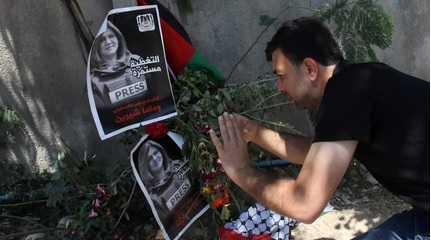
14 May 2022; MEMO: The site of journalist Shireen Abu Akleh's murder at the entrance to Jenin refugee camp has turned into a memorial for Palestinians.
Since the early hours of Thursday morning, Palestinians have flocked from various places to visit the site where Abu Akleh was shot to lay flowers and pray for her.
Pictures of Abu Akleh were hung on the trees surrounding the area, along with Palestinian flags and a traditional keffiyeh.
On the ground where Abu Akleh fell after being shot lay bouquets of flowers and letters.
One of the messages read: "The picture became clear, and the coverage was absent. Shireen Abu Akleh is a word that does not die. May your soul rest in peace."
On Wednesday morning, the Palestinian Ministry of Health announced the death of Shireen Abu Akleh: "As a result of being shot by the Israeli army in the city of Jenin."
Al-Jazeera network and the Palestinian Authority accused Israel of deliberately killing Shireen Abu Akleh by shooting her while she was working, while the Israeli army said that its initial findings were that she was "killed by Palestinian gunmen."
Abu Akleh was born in Jerusalem in 1971 and was one of Al Jazeera's first correspondents, joining the channel in 1997.
Majd Owais, a young man, living in one of the nearby houses, said that he attended: "In honour of Shireen and her great national role."
He added to Anadolu Agency: "Since yesterday, the site has constantly had citizens who came to pray for her."
Owais continued, pointing to traces of bullets: "Look, this is what the exploding Israeli bullets left behind on the trees and stones. These bullets are known, they are only used by the Israeli army."
He said that Abu Akhleh, accompanied by her colleagues, was wearing a special press vest and that the Israeli army saw their location, and shot at them directly.
In the same place, Ayman Khalil, from the village of Anin,stood shedding tears. He told Anadolu Agency that he decided to visit: "Abu Akleh's martyrdom site, to pray for her and see where she was targeted."
He added: "We all cried despite not knowing Shireen personally, but we have known her through her news coverage for decades. Shireen, you served the country by conveying the image of the truth."
Mamoun Fashafsha, a Palestinian from the village of Jaba' in the Jenin governorate, told an Anadolu Agency correspondent that he came: "To inspect the site of the martyrdom, and pray for Abu Akleh."
He added: "Shireen means a lot to us, she lived in the memory of generations, and her memory will remain for many years. Shireen has reported many events over many years. She is a resistance fighter and gave to the Palestinian cause what others were unable to provide, through her voice and coverage."
Fashafsha accused the Israeli authorities of deliberately targeting Abu Akleh for her pioneering role in providing press coverage and exposing Israeli crimes.
Many residents of Jenin camp recall their memories of Abu Akleh during her coverage of the Israeli invasion of the camp in 2002.
Umm Ahmed Freihat, a resident of the camp, said in tears:"Shireen lived the camp battle with us. She reported the Israeli massacres and the destruction they left behind. She searched among the ruins for our children."
In an interview with Anadolu Agency, she added: "She wasthirsty and without water. Her clothes were dirty, so I gave her clothes from my home. Shireen is gone and her absence hit my heart like a thunderbolt."
In April 2002, the Israeli army entered the city of Jenin and its camp, and within ten days, at least 52 Palestinians were killed, about half of them civilians. Around 150 buildings were completely destroyed, dozens were partially destroyed and about 435 families were displaced, according to human rights reports.




